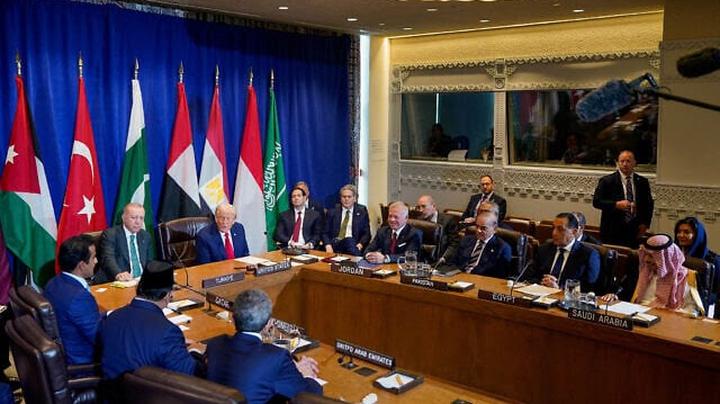Arab, Muslim-majority Countries Respond to Gaza Peace Plan Proposed by US President
The plan – spanning 20 points and titled the Comprehensive Plan to End the Gaza Conflict – has been accepted by Israel, with Prime Minister Benjamin Netanyahu standing beside Trump as the announcement was made. But the deal’s success still hangs on one crucial response: Hamas. So far, no official word has come from the group, though it has reportedly agreed to study the proposal “responsibly,” according to regional mediators.
While the public statement from the eight nations expressed confidence in Trump’s ability to “find a path to peace,” the real details lie in what’s next. The ministers emphasized their commitment to working closely with Washington and all relevant parties to ensure the plan is implemented – not just signed and shelved.
They’re backing a framework that promises immediate humanitarian aid, a full Israeli military withdrawal from Gaza, the release of all hostages, and, ultimately, the foundation for a two-state solution that unifies Gaza and the West Bank under a single Palestinian government. It’s the kind of sweeping vision that’s been promised before – but rarely with so many regional players on board.
There’s an ambitious list of goals packed into this plan: prevent forced displacement of Palestinians, rebuild Gaza’s devastated infrastructure, create a long-term security mechanism to protect all sides, and usher in a future Palestinian state under international law. All of this is framed as essential not just for Gaza but for broader regional stability.
Interestingly, among the eight signatories, several already maintain diplomatic ties with Israel – some warmer than others. Egypt, Jordan, the UAE, and Turkey all fall into that category. Saudi Arabia and Qatar do not officially recognize Israel, though both have been active behind the scenes during the conflict, with Qatar in particular playing the role of mediator. Israel, for its part, continues to eye future normalization with Riyadh.
Then there’s Indonesia and Pakistan – two of the world’s largest Muslim-majority countries. Both have said, repeatedly, that they won’t consider relations with Israel until a Palestinian state is realized. Yet despite that, Indonesia has offered up troops for a possible peacekeeping mission in Gaza, while Pakistan appears keen to curry favor with the Trump administration.
Trump, never one to downplay support, highlighted a message from Pakistani Prime Minister Shehbaz Sharif, who preemptively voiced his belief that the US president was “fully prepared to assist in whatever way necessary” to end the war. The statement went live on X before the White House even made its announcement.
Under the plan, if both Israel and Hamas sign on, hostilities would end within days. Hostages would be released within 72 hours. Hamas fighters willing to renounce violence and disarm would be granted amnesty. Those who choose to leave Gaza would be permitted to do so safely. It’s a fast-moving timeline – at least on paper.
Once the guns fall silent, aid would pour in. The proposal envisions the Strip undergoing not just physical reconstruction, but social and ideological transformation as well: demilitarization, de-radicalization, and, critically, redevelopment. That would be overseen by a transitional government made up of Palestinian technocrats, supported by an international board chaired by Trump and including figures like former UK prime minister Tony Blair.
An international security force would gradually replace the IDF in the Strip, assuming control as Israel pulls back. Meanwhile, reforms within the Palestinian Authority would begin – reforms that have been demanded for years, both internally and from abroad.
The timeline for broader statehood, though, remains vague. There’s no fixed deadline. It’s more a roadmap than a ticking clock.
Still, the Palestinian Authority welcomed the proposal. Officials praised Trump’s determination to resolve the conflict and voiced confidence in his ability to push forward. They committed to working with both regional allies and international actors to move toward a two-state solution, while also pledging internal reforms. That includes holding long-delayed presidential and parliamentary elections within a year of the war’s end.
In a statement issued in both Arabic and English, the PA said it would also revise its educational curriculum, responding to longstanding criticism from Israel that the material encourages violence. “We have affirmed our desire for a modern, democratic, and non-militarized Palestinian state,” the PA said, emphasizing their intention to build a pluralistic society grounded in democratic norms.
But while officials struck a hopeful tone, not everyone was buying in.
The Palestinian Islamic Jihad (PIJ), still holding at least one hostage in Gaza, offered a sharp rejection. In a blunt statement, the group argued that the plan would only deepen aggression against Palestinians. They accused the US of trying to impose on the region what Israel couldn’t achieve through military force alone.
“This is a recipe for continued aggression,” the group declared, adding that the plan amounted to a US-Israeli attempt to reshape the region’s future without Palestinian consent.
On the ground, reactions have been mixed. Some in Gaza scoff at the plan, seeing it as just another foreign-imposed solution dressed up in the language of peace. Others – wary, weary, but desperate – allow themselves a sliver of hope that, maybe, this time something will change.
After all, the war has dragged on for years. The cost has been staggering. And while the political chess game continues, civilians are still paying the price.

